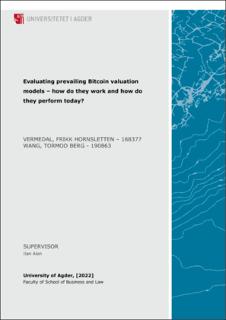| dc.description.abstract | Bitcoin has, since the first coin was mined in 2009, taken the world by storm. Today, millions of people are embracing the digital currency, and is evident that the growth is not going to halt any time soon. The increased adoption of Bitcoin raises the question about the fair value of the asset. What is the best way to fairly value Bitcoin, if it has any fundamental value at all?
Numerous valuation models for Bitcoin have been proposed throughout the years. The majority of today's most popular models were presented between 2017 and 2019, and much has transpired since then. In this thesis, we will examine Bitcoin's underlying technology and the opportunities and challenges it brings for the contemporary world. Currently, we are discovering that digital assets and Bitcoin offer a number of opportunities that provide utility and convenience for consumers that utilize the digital asset market. To maintain objectivity, we will also discuss the issues connected with the widespread use of digital assets like Bitcoin. Finally, we will explore whether present techniques of valuing Bitcoin may be regarded as a "fair" manner of valuing Bitcoin. In addition, we will contribute to the existing research on Bitcoin valuation by suggesting improvements in the current valuation methods that we believe holds merit. | |
